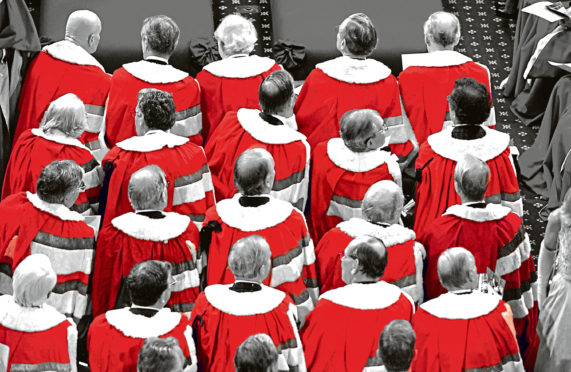
The House of Lords is an “archaic disgrace” and should have been “swept into the dustbin of history a long time ago”, an SNP report concludes.
The party’s analysis claims peers claiming £323 a day tax-free, plus travel, to take part in parliamentary proceedings can go years without uttering a word in debates.
Scotland’s 83 peers claimed £2.3 million in 2019-20 but, according to the SNP, they are unrepresentative of the country’s political views, gender balance, and different social backgrounds and age groups. According to the party’s research, 69% of Scottish peers are aged 65 or over and only 17% are women. The 20-page report also says that 55% of Scottish peers attended a private school, compared to less than 6% of the population. The Conservatives make up 10% of Scottish MPs but account for 45% of Scottish peers.
Labour has one MP but 32% of Scotland’s peers are affiliated to the party. The Lib Dems hold 7% of Scotland’s seats in the House of Commons but account for 11% of the country’s peers.
The report, authored by SNP MP Tommy Sheppard, also says that despite 81% of Scottish MPs supporting Scottish independence, there are no pro-Yes voices in the House of Lords.
The Edinburgh East MP says in the report’s conclusion: “As an institution, we believe it to be an archaic disgrace, serving a chamber of cronies, and we believe it should have been swept into the dustbin of history a long time ago.
“The House of Lords is an affront to democracy. The depth and breadth of its deliberately unrepresentative character is stark. It extends to political affiliation, political views, gender, age and social background.”
The SNP has long called for the abolition of the upper house of the UK Parliament and has never nominated anyone for the Lords.
The report says: “The principled position of the SNP not to take seats in the House of Lords may be used as an attempt to explain the denial of a pro-independence voice.
“However, this does not provide an adequate explanation for the absence of non-party but pro-independence peers, peers who would reflect the substantial and growing support for independence amongst the Scottish people.”
Since becoming Prime Minister in July 2019, Boris Johnson has appointed 79 peers including his own brother Jo, former Scottish Conservative leader Ruth Davidson and former cricketer and Brexit campaigner Ian Botham.
Johnson also brushed aside objections from the House of Lords Appointments Commission to the nomination of Peter Cruddas, who donated £3.5m to the Conservatives. Cruddas resigned as the party’s co-treasurer in 2012 after offering undercover reporters access to then-Prime Minister David Cameron in return for £250,000 in donations.
Lord Lexden, deputy speaker of the Lords, said in December that Johnson’s “shamelessness” had created the worst honours scandal in 100 years.
The Lords currently has about 800 sitting members, making it the second-biggest legislative body in the world.Professor Meg Russell, director of the constitution unit at University College London, said: “Abolition is an extreme position that not many people share. Wholesale reforms tend to split opinion and the government is never motivated to do them.
“But there are some urgent needs for reform, and the biggest problem is the size of the place is getting bigger and bigger and the Prime Minister can make as many appointments as he wants with virtually no oversight at all.
“There is a growing sense that there is a tendency by this prime minister and some previous prime ministers to deliberately make it bigger in order that it looks less defensible because that strengthens the government against parliament.
“It is a paradox that the government controls the make-up of one chamber of parliament but that it can use that to strengthen its own position and by strengthening its own position it damages the legitimacy of the place, which also strengthens its position because governments don’t love to be asked questions in parliament. They would prefer to have an easy life and so they like putting their own supporters in the Lords. If that damages its reputation, that doesn’t necessarily upset the government, which is a really big problem.
“Personally, I would take small steps because they’re the ones that tend to happen. The first would be to put pretty stringent limits on the prime minister’s appointment power. You could also require there to be fairer representation of different parts of the UK, a fairer balance of men and women, and across different professional backgrounds.
“You could have clear rules on the share of seats between the parties so that they are proportional to how people vote, rather than just being controlled by the Prime Minister.”
The Sunday Post view: An election that is already won and a democracy that is not quite right
Russell said of the SNP’s position: “It is a bit of a shame that they don’t nominate. If they want some pro-independence voices in there, the easiest way to achieve that would be to change their policy of not accepting nominations. The Greens get some nominations now and the Northern Irish parties that seek to take seats at Westminster have representation.
“It is this self-denying ordinance that largely accounts for the lack of pro-independence voices. Clearly there is an important voice in British politics missing from the Lords, but it is difficult for a prime minister to find pro-independence voices who are not from the SNP.”
Willie Sullivan, Electoral Reform Society Scotland senior director, said: “These figures highlight the pressing need for reform. Westminster looks desperately out of touch and outdated, and the unelected second chamber plays a big role in this.
“We need a democratic second chamber bringing together voices from across the nations and regions of the UK. There is an opportunity to drag politics into the 21st Century, and begin to tackle the dire political inequality we see across Britain and create a union that people really want to be a part of.”
The House of Lords said: “The House of Lords is a busy and effective chamber, improving legislation and holding the government to account. Its members debate hundreds of changes to improve legislation every year, table thousands of written questions on vital policy issues, and make up influential Select Committees whose reports play a key role in public life. Members take their role very seriously, shaping and voting on laws that affect all of us.”
Beyond repair
By Tommy Sheppard, SNP MP
The House of Lords is an out-of-touch and undemocratic institution – and the SNP’s position has been as consistent as it has been clear: We support its abolition.
The findings in this new report shine a stronger light on how broken the Westminster system is, how it refuses to accept democratic reforms, how it utterly fails to properly reflect different parts of the UK, and the extortionate cost to the taxpayer to maintain the Lords.
Given the lack of accountability, it is little wonder the Lords is stuffed with Scottish Tories – including the soon-to-be Baroness Ruth Davidson, who is running scared from the judgment of the Scottish electorate after being appointed by Boris Johnson’s government.
As an institution, the Lords – the second biggest legislative chamber in the world after the National People’s Congress of China – is an archaic disgrace, serving a chamber of cronies, party chums, election-losing has-beens, and friends and families of those in
high office.
Westminster is broken beyond repair and it’s clear that Scotland faces a choice of two futures – an out-of-touch and broken Westminster system acting against our interests, or the opportunity to build a fairer and democratic society as an independent country in a post-pandemic referendum.
Capable of reform
By Lord Soley, Labour peer
Our system of government needs reform. Devolution brought in by Labour was an important step forward but we need to bring the UK back together again with a chamber representing the nations and regions of the UK.
The House of Lords does a good job improving legislation that comes from the Commons. It is respected around the world for that, not least in the EU which recommends our reports as compulsory reading even after Brexit.
Contrary to popular belief, the Lords can’t legislate except in rare circumstances. Only the elected Commons can do that. Everything the Lords does can be thrown out by the Commons. But the SNP, like other parties, keeps voting for the changes made by the Lords. How weird, given that they say we are a waste of space.
The SNP chooses not to take any seats in the Lords, so they don’t have a voice but they still keep voting for all that we do. It’s not logical but whoever accused the SNP of being logical? Maybe their internal divisions are confusing them.
The Lords needs reform, and it can be part of the answer to the current disunity in Scotland and the UK. So why don’t the SNP join the real debate?
Kezia Dugdale: After all we’ve been through, we mustn’t go back to normal

Enjoy the convenience of having The Sunday Post delivered as a digital ePaper straight to your smartphone, tablet or computer.
Subscribe for only £5.49 a month and enjoy all the benefits of the printed paper as a digital replica.
Subscribe © Andrew Maccoll/Shutterstock
© Andrew Maccoll/Shutterstock